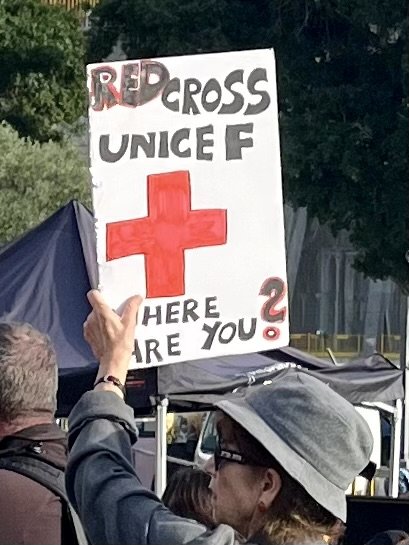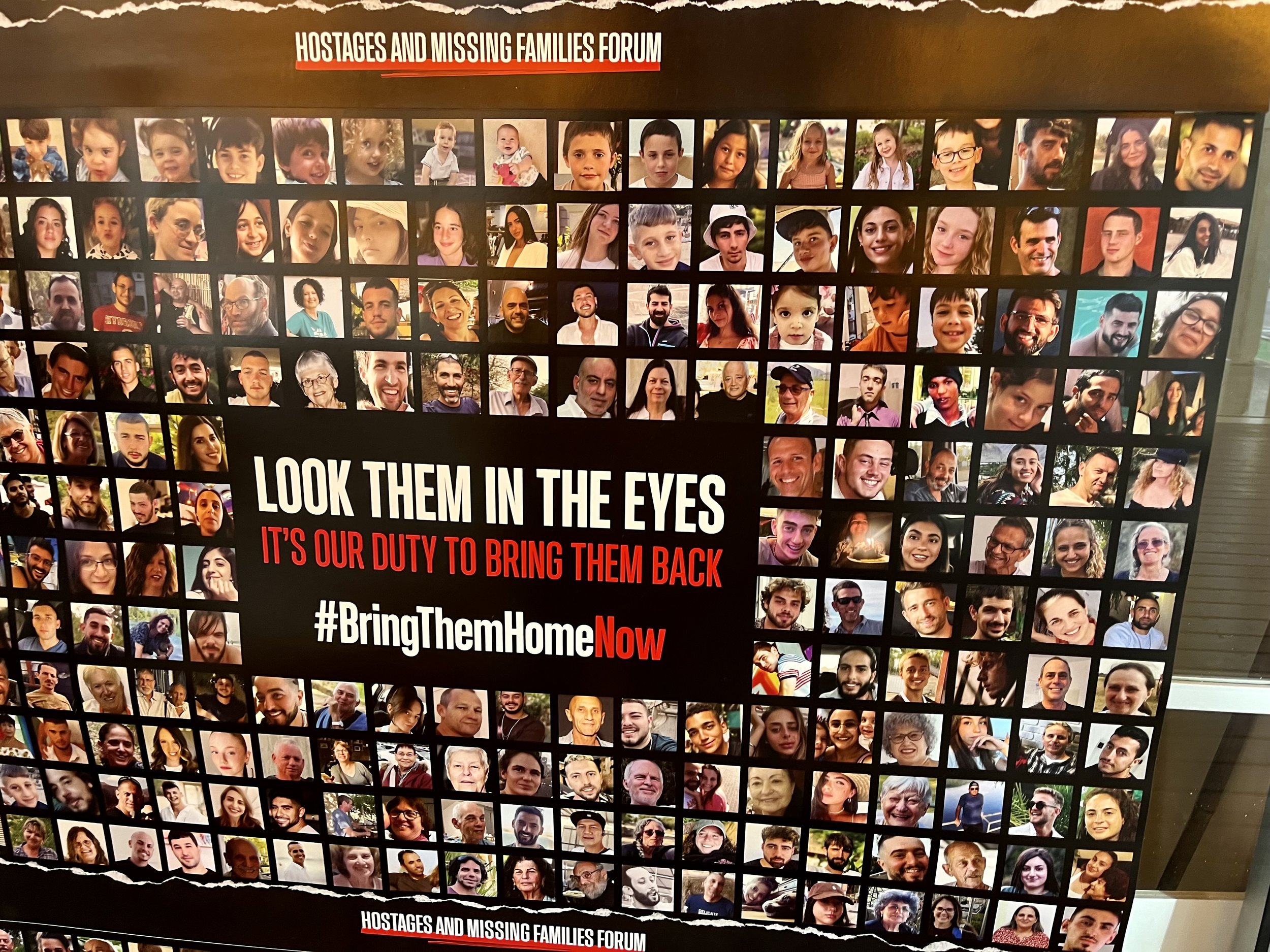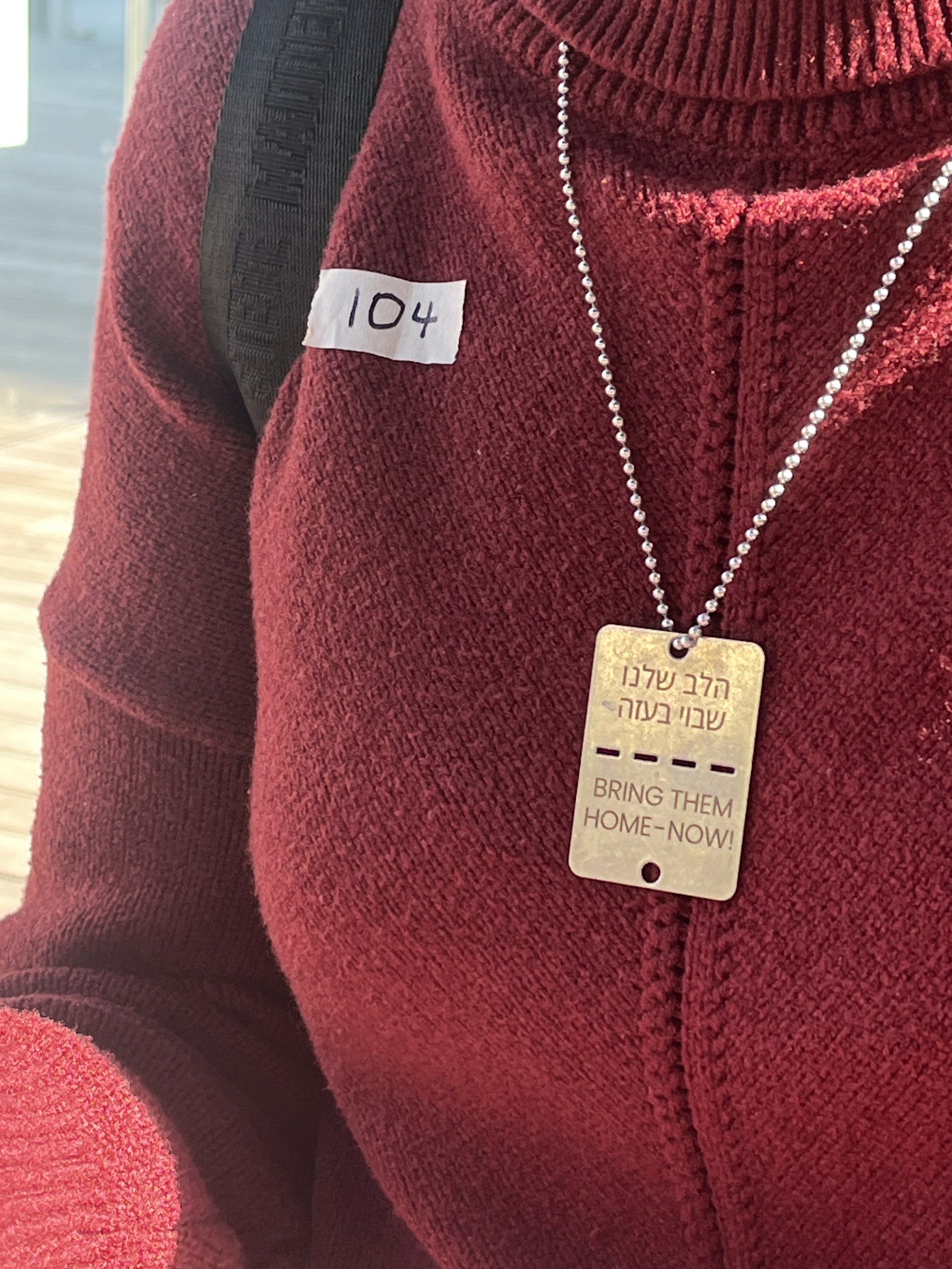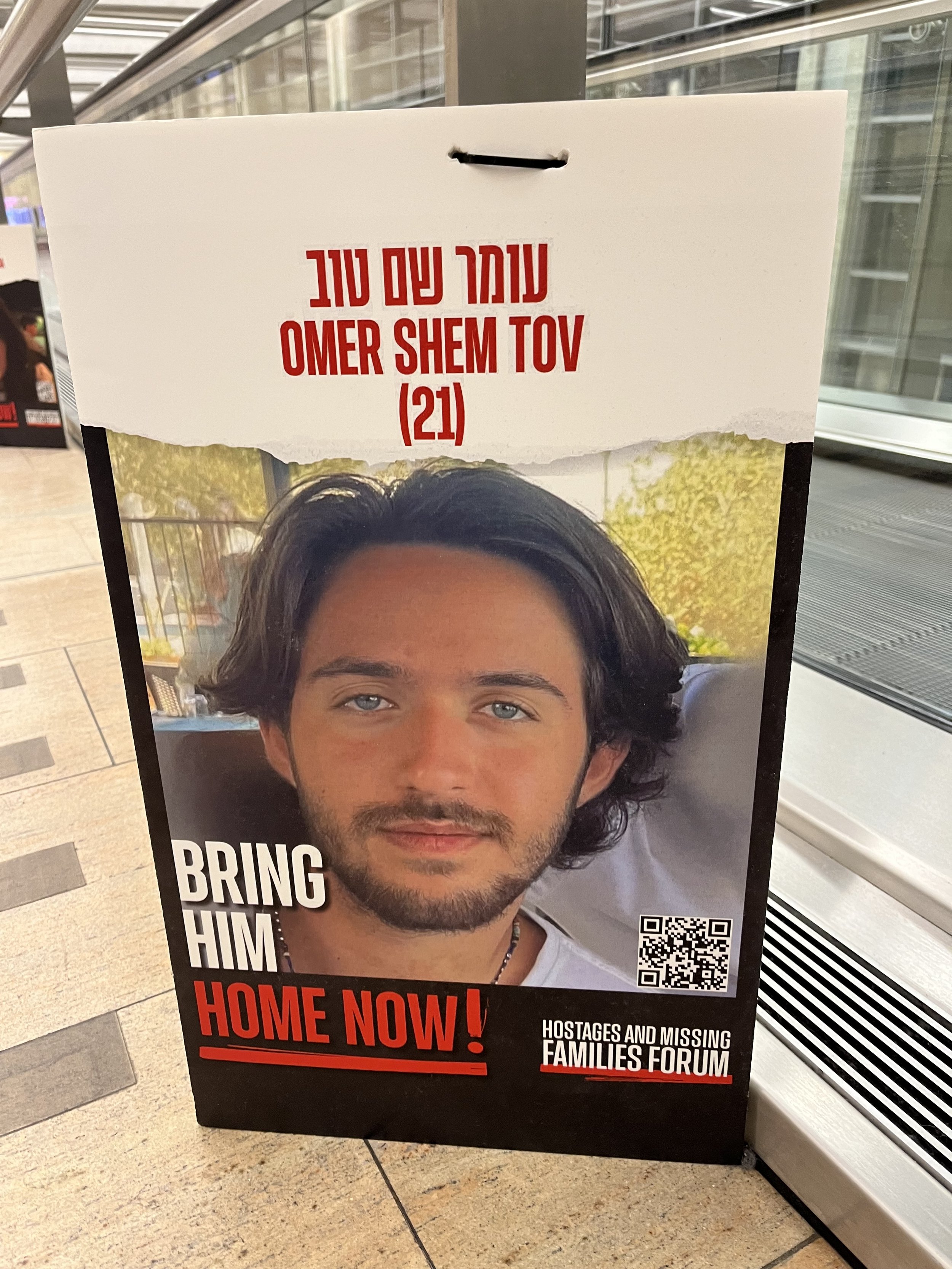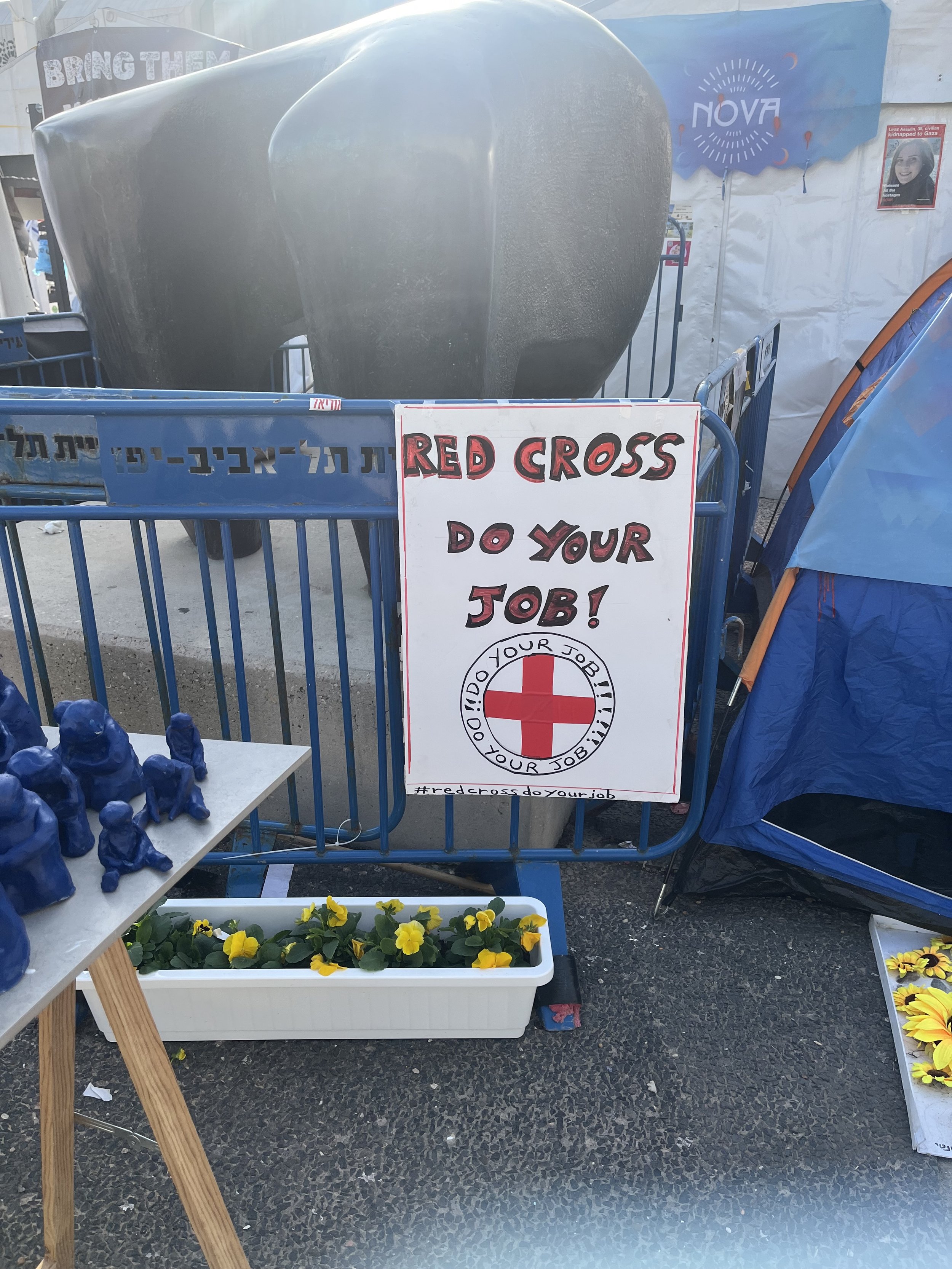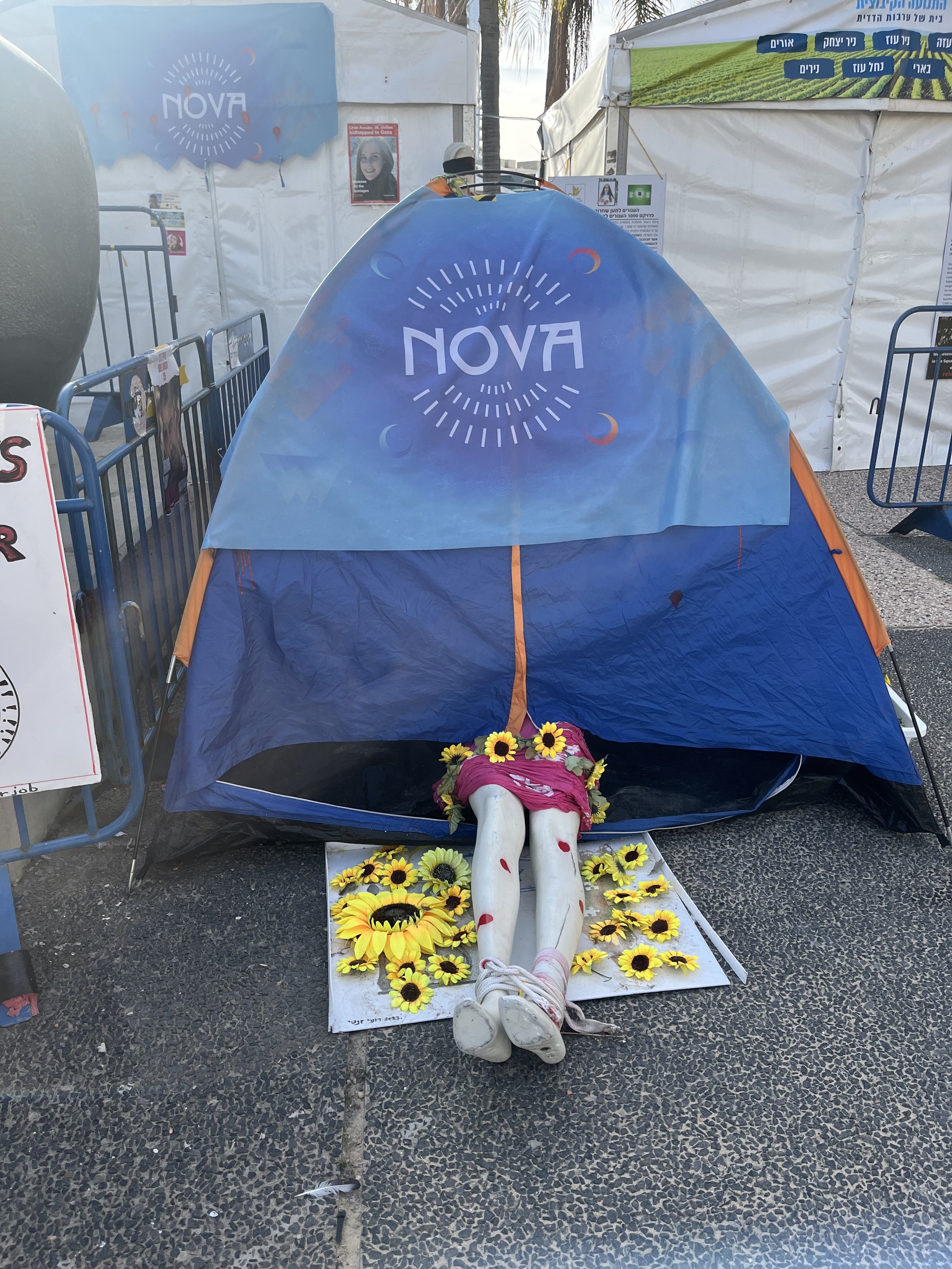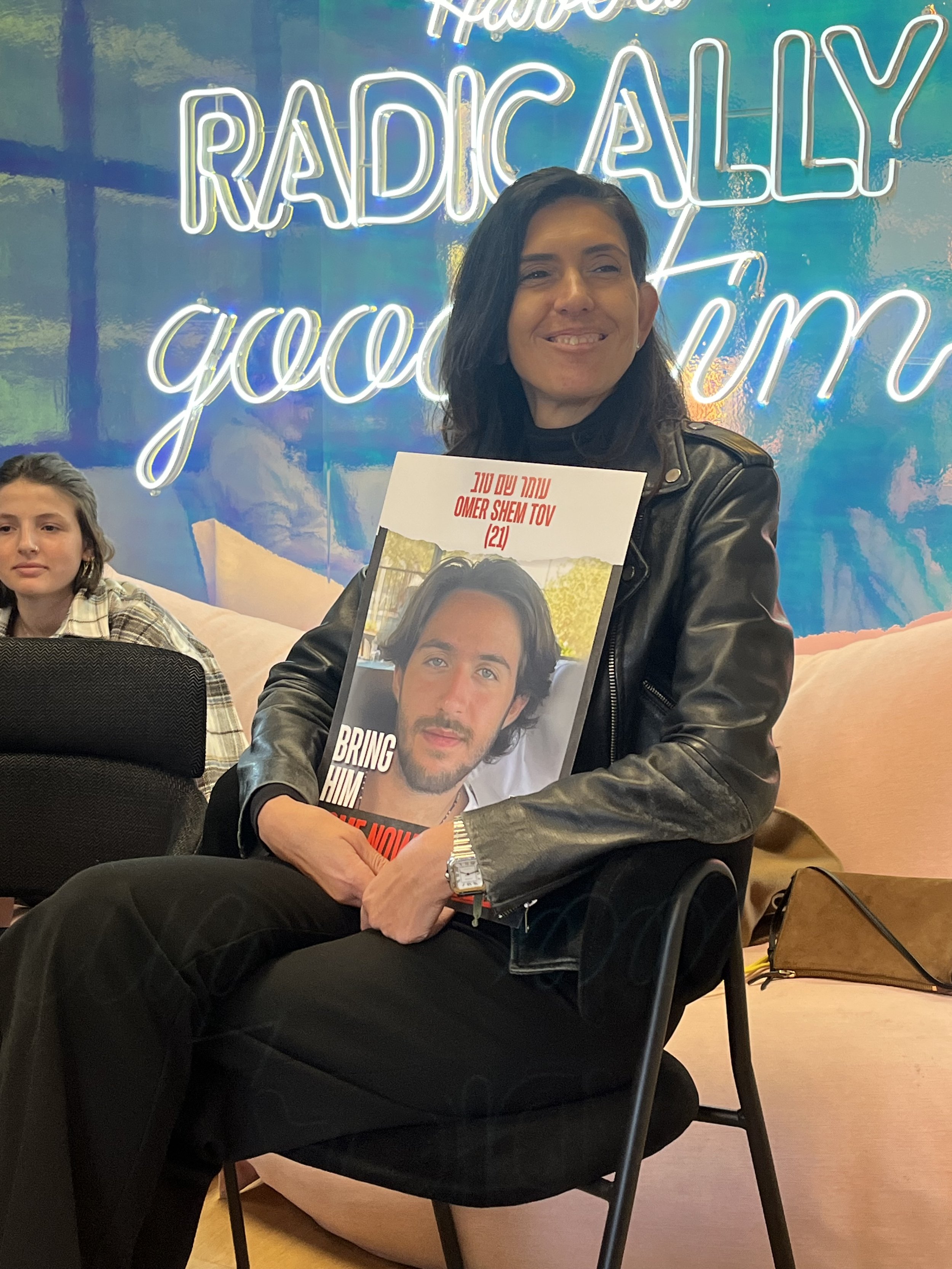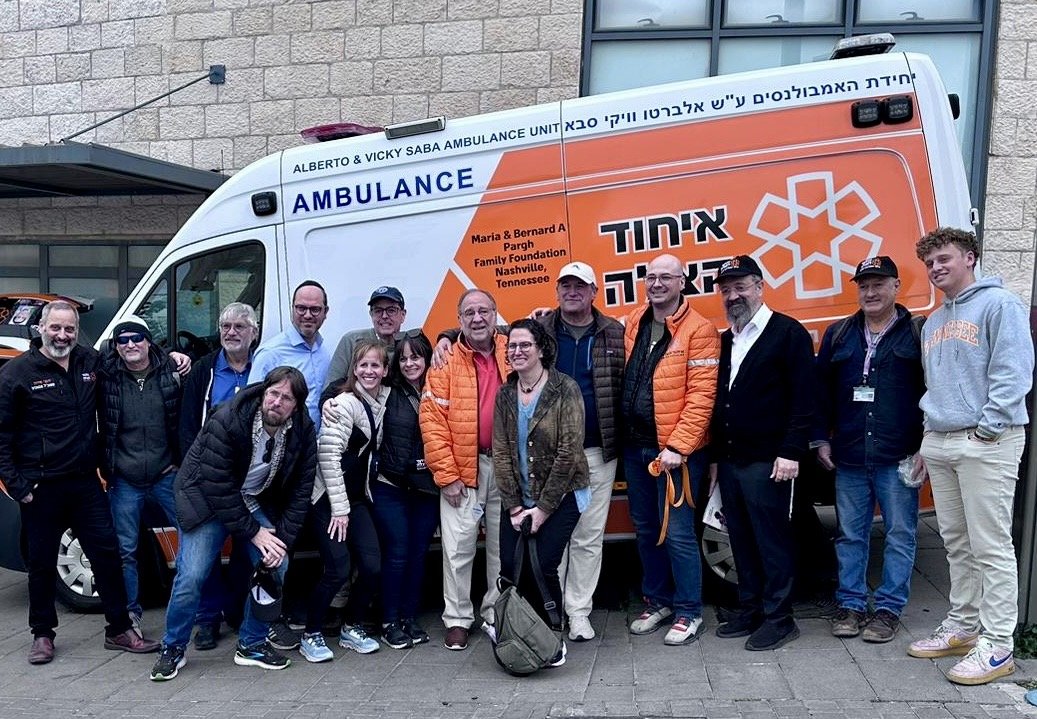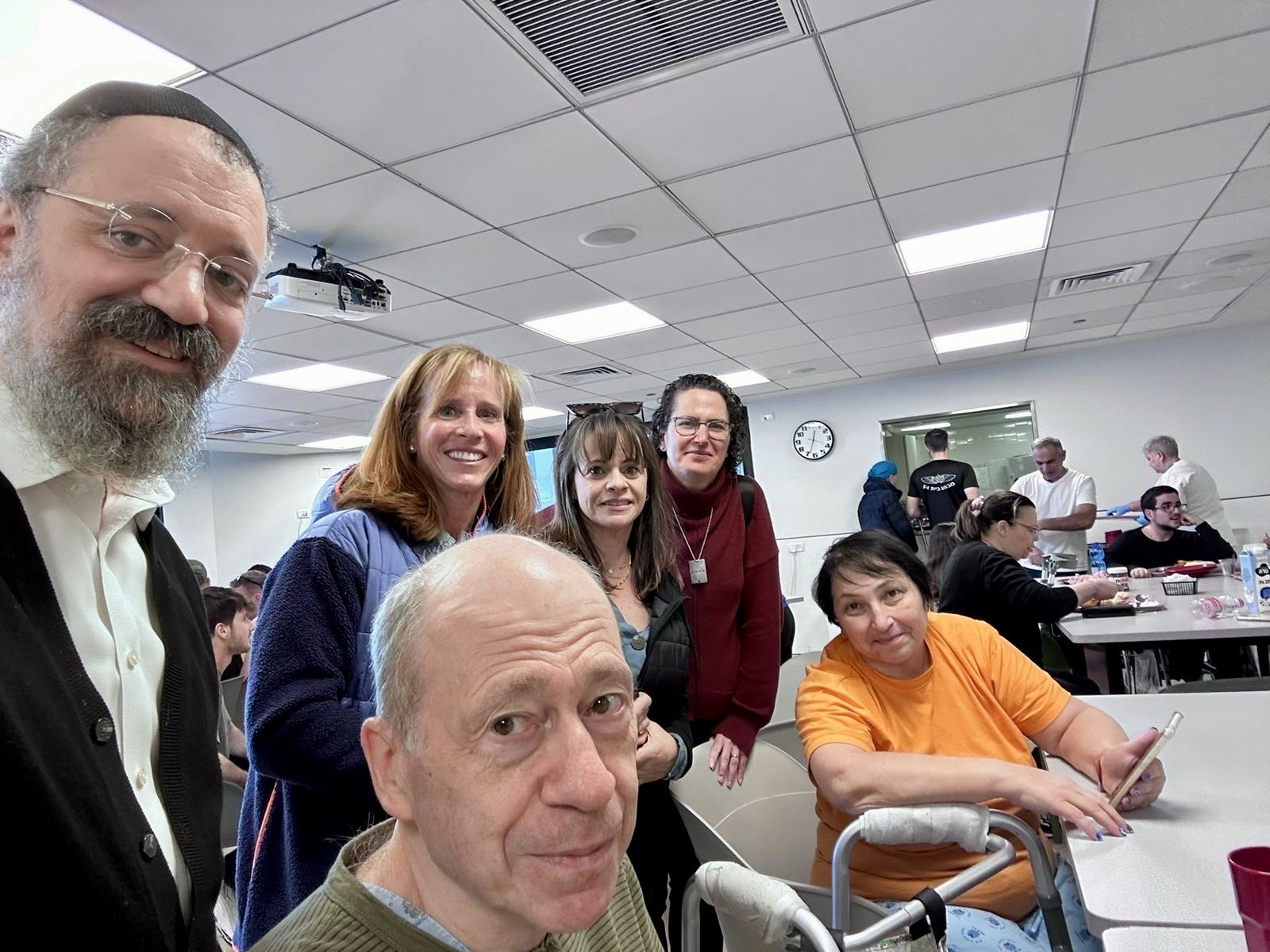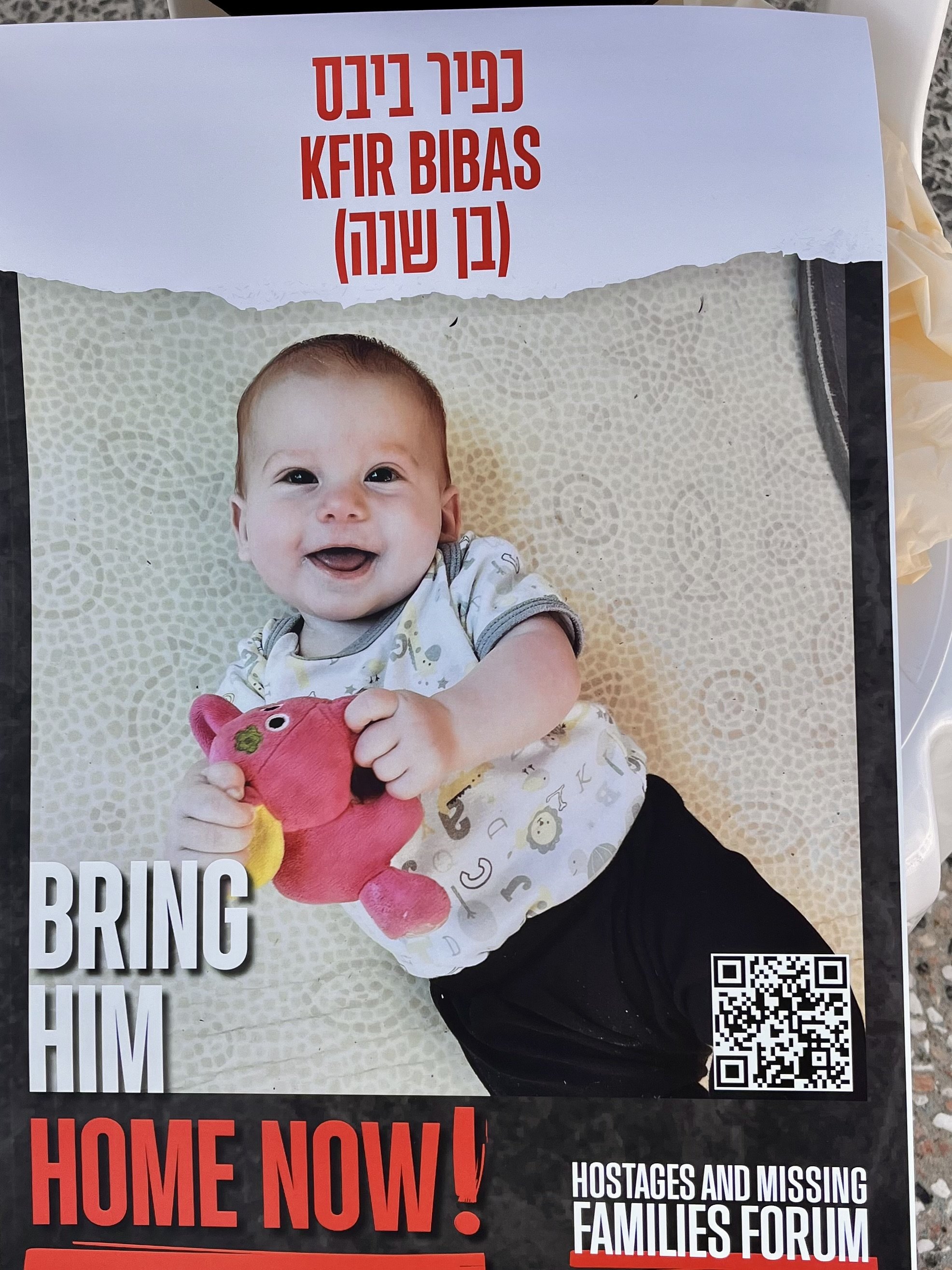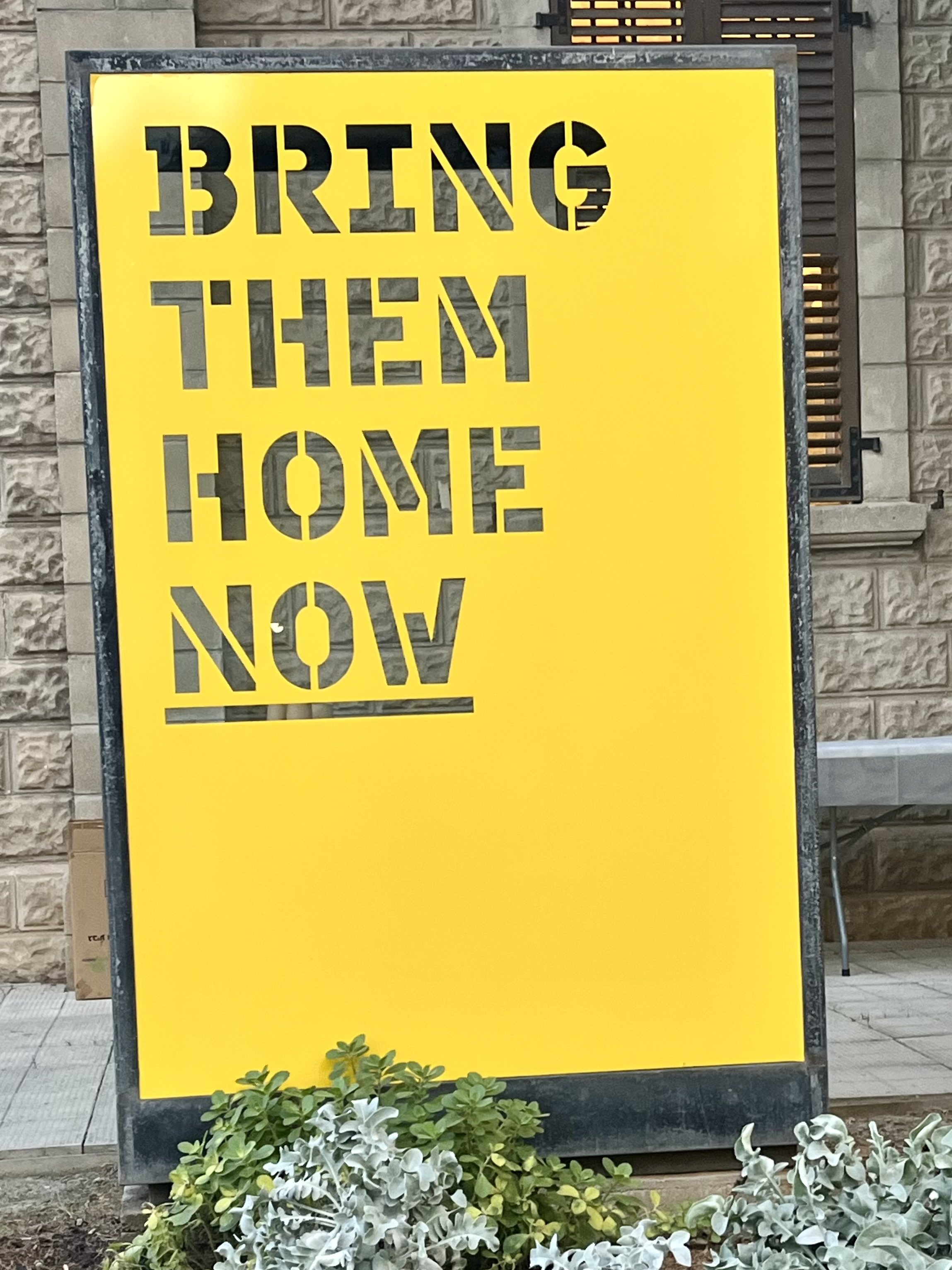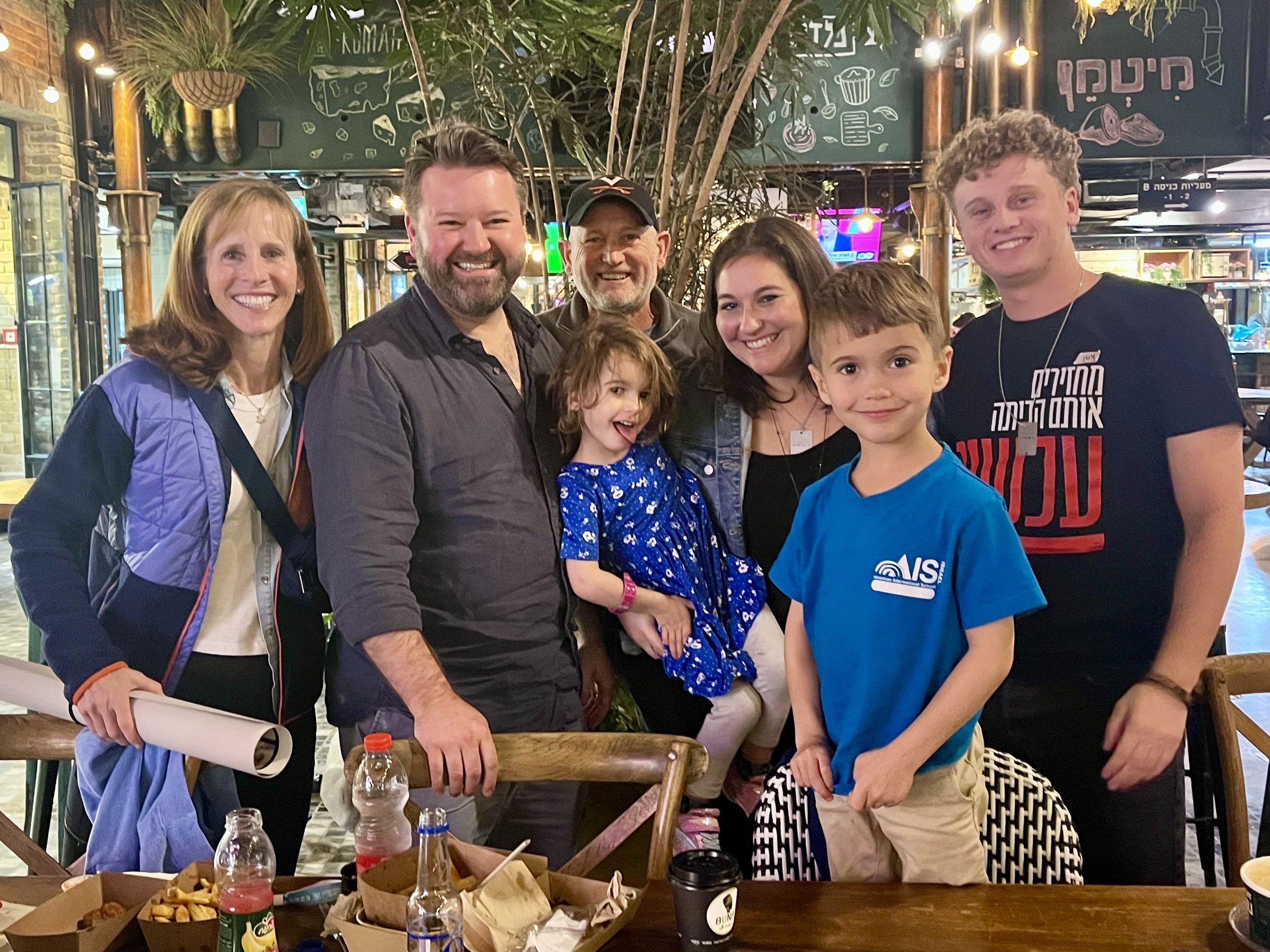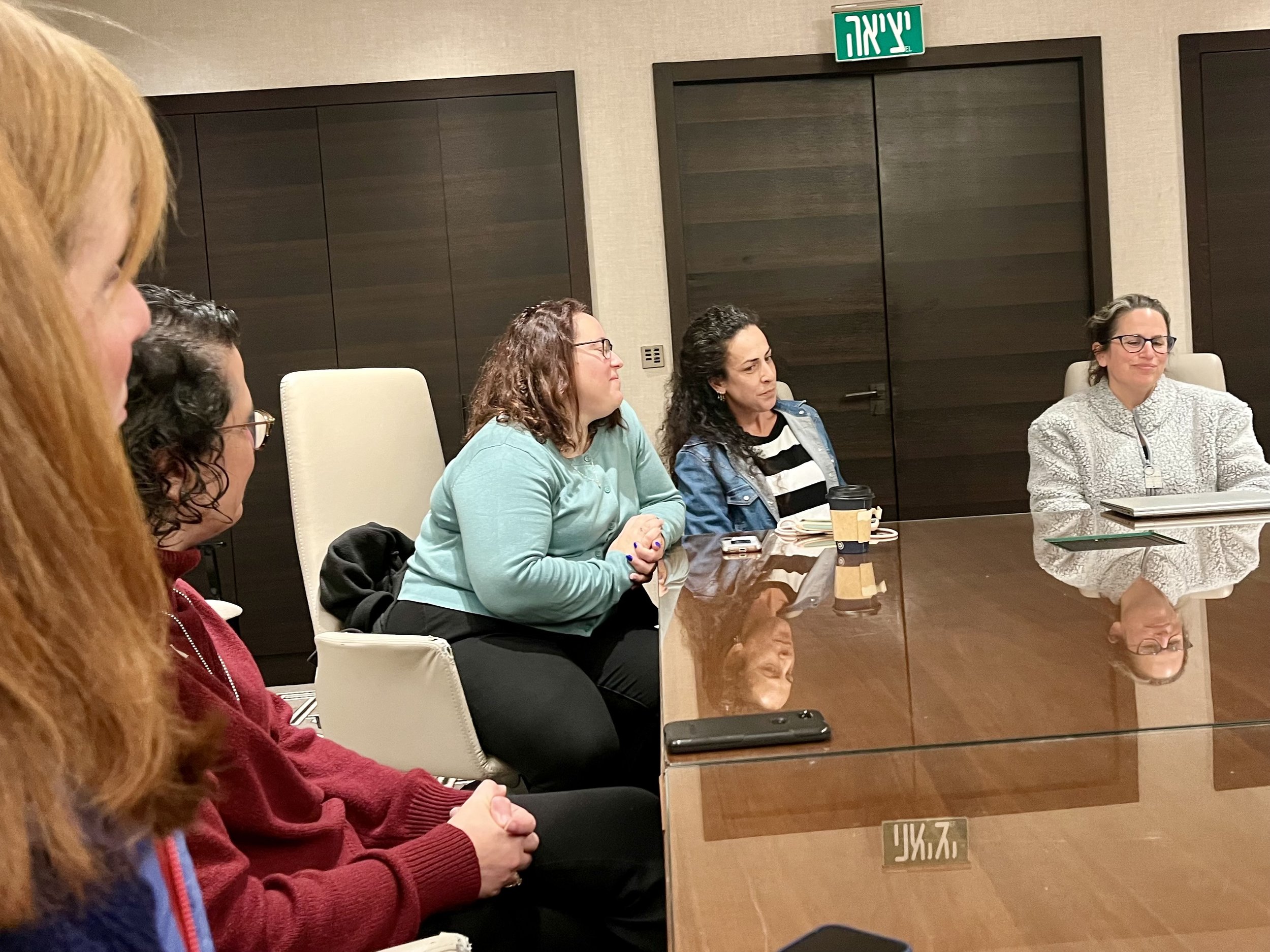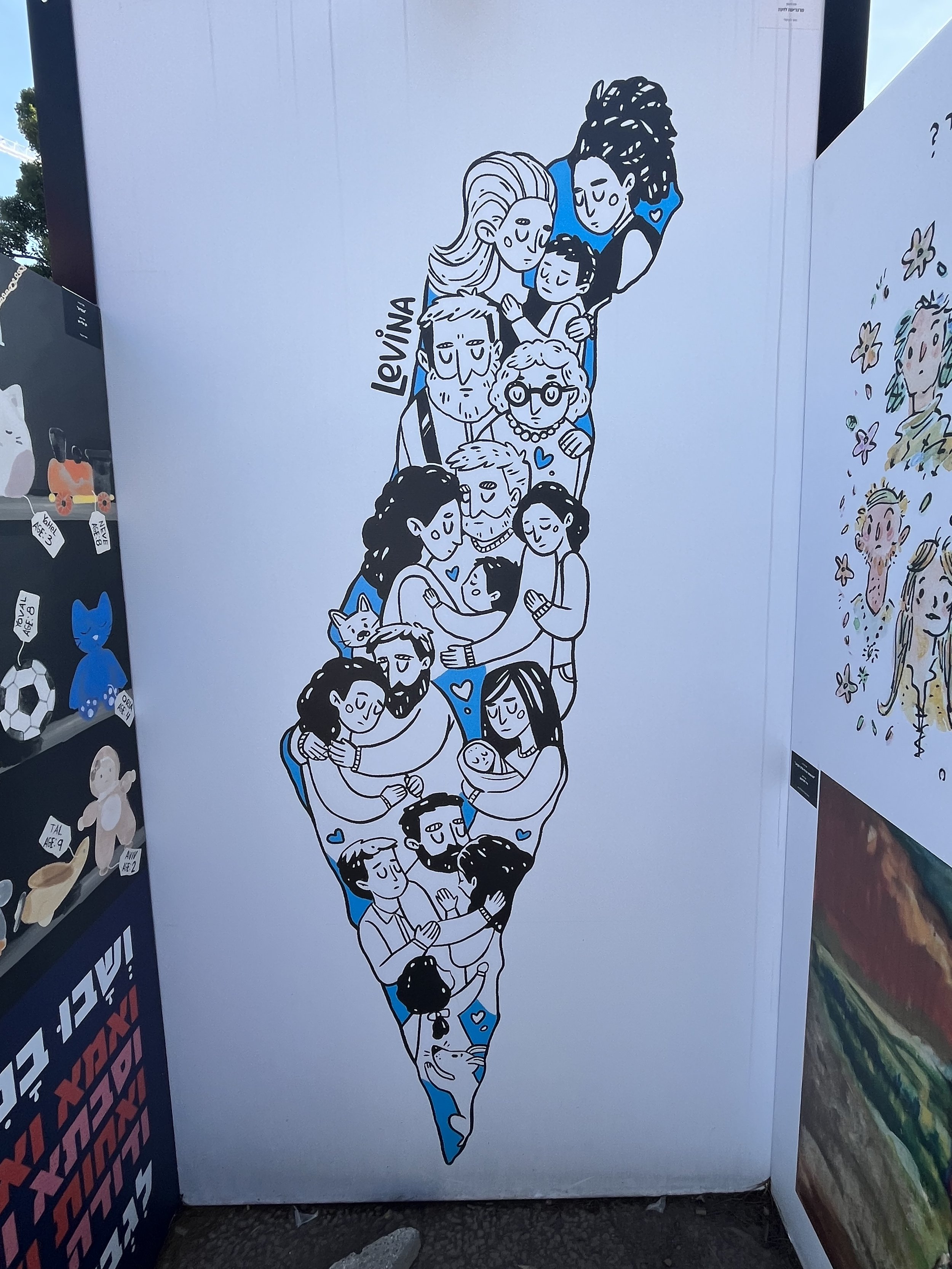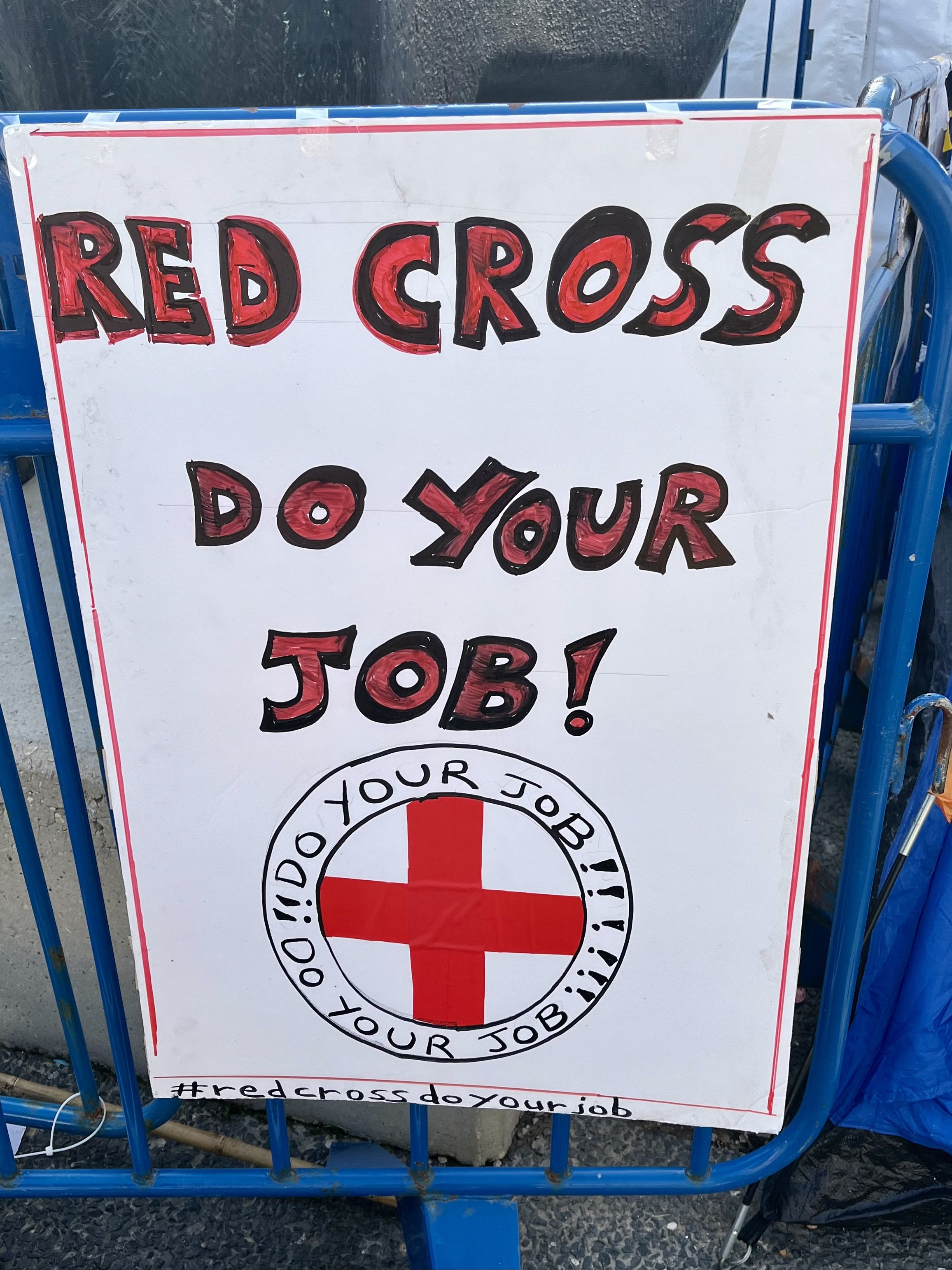ENTRY 1
We began the morning meeting with evacuees from Kibbutz Or Ha-Ner. Or Ha-Ner is just north of Sderot near the northern tip of Gaza. The evacuees are currently living at the Orient hotel in Jerusalem where they have been for the past two months. You might think that it would be quite luxurious to live in a 5-star hotel, but it's the opposite environment from a lush, nature-filled kibbutz. We met with Hadas, T'chelet and Shani, three women from the community of 950 of which 500 are here in the hotel, 200 of which are kids ages 0-18. There is another concentration from the kibbutz in Tel Aviv and then scattered all over Israel.
Hadas:
"On Oct 7th, missiles landed in the kibbutz, but everyone was ok in their safe rooms. No terrorists came there. They were across the street in Kibbutz Eretz. Our people helped fight there. From Sderot to our kibbutz is just 20 min walking in the field. We feel lucky. We mostly left Saturday the 7th. On Sunday the 8th, we were told we must evacuate.
T'chelet:
"Parents with little kids are scared to go home. The elderly and teens want to go home as quickly as possible. Kids with special needs are struggling. For so many reasons, we all need and want home. The community is our biggest strength and support for getting out of shock and depression. The first week was a nightmare. Little by little, we started volunteering and doing what we could to chip in even in the hotel."
Shani:
"It’s tough and difficult and everything is more complicated. The community has really allowed us to not go into the dark place. We all help each other."
They anticipate moving home in shifts. Those most urgently who need to go back will go first. They share that there is a trust that was breached by the government, and they (the government) need to give them some certainty that they will be safe when they go back. "We lost the trust in many institutions in Israel."
We asked: What will it take for you to feel safe to go back?
They have a list of conditions on which they would go back home and there will be a vote by the community, but some are going back anyway because it’s a challenge to live long term in a hotel.
Those who grew up in the kibbutz and whose whole extended family lives there cannot imagine living anywhere else, but still don’t feel safe enough to return right now. The new families are more afraid and not inclined to go back so quickly. They all long for the community of the kibbutz. Some are asking for a small army all the time guarding the kibbutz, fully equipped to protect. Other community members worry that such a presence is not healthy for the kibbutz kids to see all the time. They all want a new electronic fence with all the newest technology surrounding the kibbutz.
Shani chimes in: "How do we know there aren’t still terrorists in the fields? We can't be sure. Being in Jerusalem is a gift AND makes it crystal clear for us that our community is perfect. We want to go home. My four-year-old just wants to go home. She doesn’t understand the war. The 9-year-old knows more. His friend was kidnapped from Kfar Azza."
T'chelet adds: "The worst impact of the war is for the teens. Without a doubt. They are lost. They don’t have their social club with activities and here they are bored and completely out of their regular routine. And they know classmates and teachers and others who have been killed. They know. There’s lots of regression with older kids out of trauma. Some are full of rage. Another can’t hear any Arabic. Others sleep in their parents' bed."
All the adults are in therapy. Literally, every adult. Right now, it’s trauma therapy. When they get home, it will be post-trauma therapy. As long as they are displaced, the trauma is ongoing.
We ask: How does the government help with costs? It turns out, most things they have are from donations from civilians. They tell us that the government has done nothing. And any money that has come is “be quiet” money. It’s not a lot and it's not so helpful. The dismay and distrust in the Israeli government is a sentiment we have heard several times on this trip.
Hadas leaves us with these sobering parting words: “We won’t win the war because we already lost on the 7th of October. But we hope to go back to zero, if that makes sense. The uncertainty is the worst part of all of this. Four months later, we must decide: do we want to live in a war zone or not? But I know we will be ok because there is no other option.”
Another recurring refrain.
And then an elderly gentleman from the community who has been sitting and listening to our conversation quietly this whole time adds: “We have to be always powerful and there are very few places in the world we can live safely.” Indeed.
ENTRY 2
We arrived at the Ichilov Hospital in central Tel Aviv. The Rabbi of the hospital greets us. He is appreciative for our visit and acknowledges: “We are not two different communities. We are in two different rooms on the same boat (diaspora and Israel).”
And then he adds: “We will win. This belongs to us. In the Bible it is written.”
The hospital holds 1500 beds. Every kind of unit. 35 surgery rooms. More than 8000 people are working here.
The Rabbi is not so much a chaplain and more an administrator of halachic issues in the hospital. Every day he fields multiple questions about kashrut. It’s the most common topic. Second most common are questions about kohanim, those who descend from the priesthood and are not permitted to be near a dead body according to Jewish law. “How do I visit when I can’t be near a dead body?” Third most common topic? What can or can’t we do regarding my loved one’s medical care?
There are 70 soldiers at Ichilov, mostly in rehabilitation. There is a helipad on top of the hospital and it’s less than an hour from Gaza to the hospital and 70 minutes until a soldier or injured individual can be in surgery.
We met with several soldiers in recovery. One was fighting in Khan Younis, Gaza and he got involved with a grenade but is thankfully doing well. Matan ended up with major shrapnel in his calf and thigh, and after several operations and a skin transplant, he started walking again. Roi is a reservist who is a second-year medical school student as well. He is the equivalent of a Navy Seal in the army… special forces. We were not allowed to photograph him. One of the less experienced members of his team started shooting in the direction of what he thought was a terrorist but instead shot Roi in the back and shoulder while Roi was shooting at the actual terrorist. He noted that the Special Forces in Israel and US Navy Seals share knowledge. And he bears no grudge against his fellow unit members. He looks forward to full recovery and wants to go back and fight more. “Anyone who saw what happened on 10/7 needs no more fuel than that. No one in our team has any motivation problem.” He receives psychological help and a therapy dog as part of his recovery. (We met the dog— beyond precious!)
What message do you want to send to America? “We need your support and help— hazbarah. We risk our lives for the Palestinian people and the hostages. We have no problem risking our lives for hostages and Palestinian civilians, but if Hamas keeps existing, they will do what they did every day. We must eliminate them. I have seen a Hamas soldier pushing a stroller with a baby because he knows we won’t shoot him because he is pushing a stroller. The IDF does everything in our power to limit civilian casualties. We risk our lives to do that. We could have finished this war from the air, but we risk our lives for the Palestinians and hostages so to limit unnecessary casualties. That’s the most important thing to know.”
We met an old friend for lunch after our hospital visit. Originally from California, he lives in Israel and has voted in several elections. He shared that “in 2016, Avigdor Leiberman, running for the Prime Minister position, warned the government that Hamas needed to be dealt with or the southern communities in Israel would pay for it. He was ignored. Again, he said the same in 2018. Again, ignored. Then October 7th. Avigdor Lieberman makes Bibi Netanyahu look like a progressive liberal. But he wasn’t wrong.”
ENTRY 3
We walk over to what’s called Hostage Square outside of the Tel Aviv Art Museum. There, via art renderings and various tents set up with folks paying homage to kidnapped members of their family or community, Israel sits watch, waiting for the return of the hostages, 136 still suffering inside Gaza. One of the stolen was a baby named Kafir Bibas. Kafir turned one today and family members came wearing orange shirts (Kafir has red hair) to “celebrate” his birthday.
From Hostage Square we walked two blocks to the Headquarters for Hostages and Families, an organization constructed to wrap a solid structure around and provide support for the families. Their goal, of course: to bring the hostages back as soon as possible. And, to keep the hostages in the headlines.
We met Shelly. Shelly is Omer’s mom. Omer is her youngest. His birthday is October 31st and he turned 20 last year. “It’s been 104 days since he saw daylight. We are in a long, long nightmare. Omer went to the Nova festival. Last time we talked to him was 8:45 am. He said they were trying to escape. He got to the car and there were shootings. He said he would call back. He sent a live location. Then the phone stopped. Then we saw the point of live location was moving to Gaza. 8pm one of his friends called and sent us a video that Hamas sent and said I think Omer is there. We opened the video and saw Omer on the floor of a pick-up truck with his friend, hand cuffed.”
That was the last time they saw Omer.
“Time stopped on Oct 7. We are not working or sleeping well. All we are doing is trying to bring Omer back home. As a parent you want to help your son physically, but we cannot. So, we are shouting it all over the world that we are in the mission of our life to bring Omer and the hostages back home.”
“We call him sunshine. Because everyone wants to be with him. He has a lot of friends. He loves life. He loves music.”
“Two friends who were kidnapped with Omer came back. One was with him 52 days. They said Omer was their big brother while in captivity and gave him strength. He was shot and Omer helped him heal his wounds, kept him going. Omer would daily do ktzat… a little bit more.”
The newly freed friend reported: “Omer likes to do the kiddush on Shabbat and one time he got a bottle of grape juice and bagel with salt, so he took the salt from the bagel and Friday he did the kiddush with a tissue on his head. The most powerful thing he has is faith. There he also did the kiddush. And he said he knows his mother is getting stronger spiritually.”
Shelly added: “I have left the light on in his room and every morning I go there and tell him what the day is, and the date and I am praying in his room and telling him we are waiting for him to come home.”
Shelly tells us that all the families of the hostages are a big family. “Only between ourselves do we know what we are going through. This place gives us the power to go through another day. From 9 am to 9pm we are here doing everything we can do. The volunteers here are true angels. No mother or father needs to feel like we feel now.”
Merav, one of the “angels” at the Headquarters shared that a generous funder bought the building and gave them four floors to use, and the funder did not have press around it. So, so humble. “And we have put beauty into such agony in this building.”
70 psychologists aid families. They have a legal team. They have a PR and communications team, their own spokesperson, their own foreign diplomacy team. They help families financially with donations.
Then we met Natalie. Natalie is 19. Both of her parents were kidnapped on October 7. Her mom came back after 54 days. Her father is still there 104 days now.
Merav made sure we understood: “They are everybody’s children and everybody’s father. Don’t just give us a hug. Ask what you can do. Who do you know? How can you influence?”
With that, our trip ends. More than a trip, a mission. More than a mission, a chance to witness, to understand, to empathize, and to be strengthened by the resolve, the heart and the grit of our family who is in trauma and in need of deep healing in Israel. As Rabbi Schiftan reflected at our final dinner: “We are an Am Kodesh—- a sacred people, an Or l’goyim— a light unto the nations. The commitment to life, to not stop until every hostage is brought home to Jewish soil— that is our gift to the world, that reverence for life that stands in stark contrast to our enemy.”
All of us count the days until we return. May the war be over and the hostages home safely long before we can board another plane back. Am Yisrael Chai.

